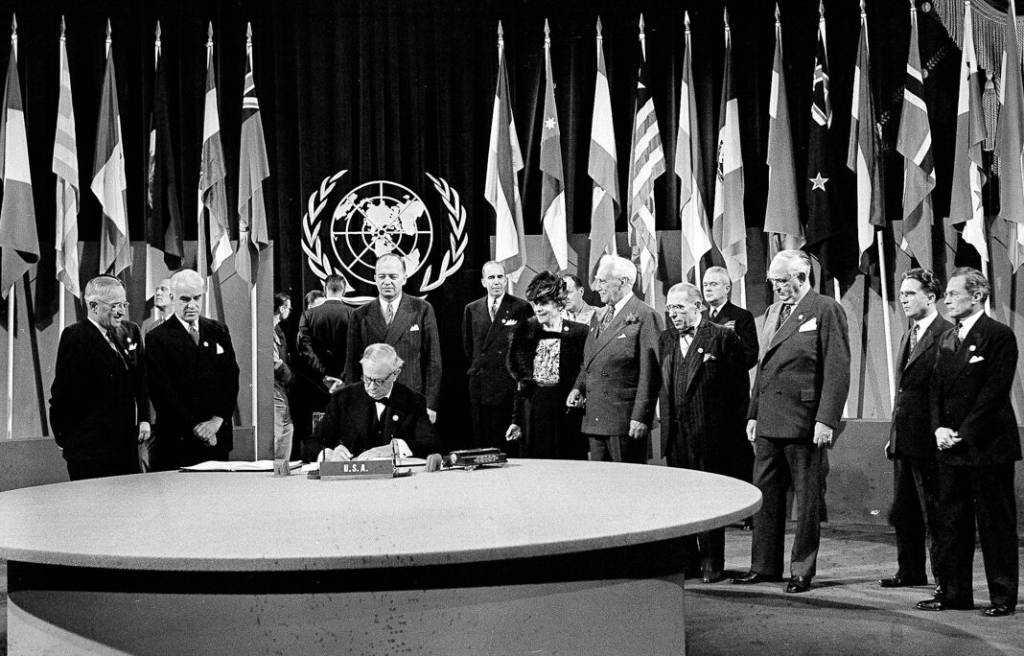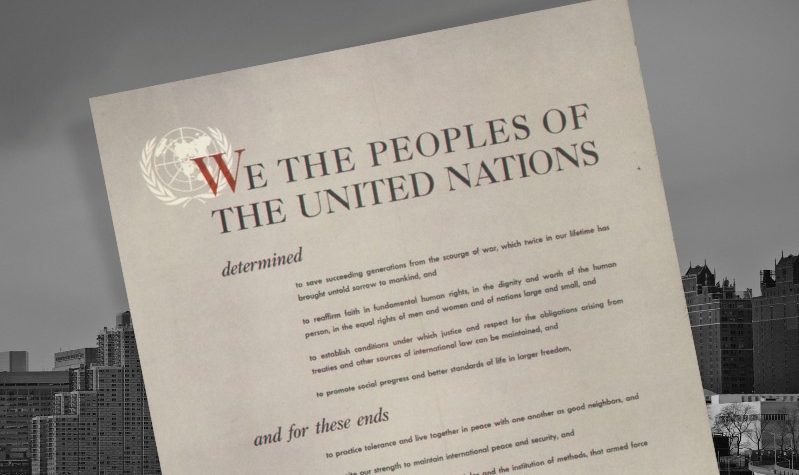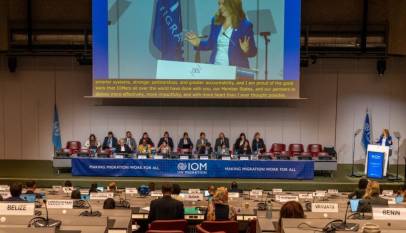OP-ED | A Thought Experiment on UN Charter Day, By Daniel Perell & Heba Aly
In commemoration of the UN Charter Day 2024 i.e. the day the UN Charter was adopted exactly 79 years ago, today (26 June 1945), Daniel Perell & Heba Aly argue the Charter was always meant to be a living document, hence it’s now time to breathe some new life into it.

The Problem
At a most basic level, the fundamental problem we face today in international governance is our failure to adjust our economic and political institutions to the imperative needs of a rapidly evolving age.
The UN Secretary-General said as much last September when in a speech before the General Assembly he noted: “we cannot effectively address problems as they are if institutions don’t reflect the world as it is.” The world has become far more complex than it was in 1945 when the UN Charter and the associated system of multilateral organizations were created.
Indeed, this system of international cooperation is no longer fit for purpose; it struggles to cope with the multiple unresolved crises we face, often because it lacks the appropriate jurisdiction, sometimes because it does not have adequate resources, at times because it lacks the conceptual framework to effectively diagnose the problems and bring about credible solutions, and most often, because it is deemed fundamentally unfair.
And so, we move on towards a potentially catastrophic future of accelerating climate change, the continued unraveling of our nuclear order, rising and destructive nationalisms, increasing conflict, more frequent pandemics, and an economic paradigm that no longer delivers prosperity for all.
A Thought Experiment
On this United Nations Charter Day, here’s a thought experiment: If we were to start from a completely blank page, with no prior mistakes to correct or historical context to maintain, what system of international governance would we design and how might it function?
No doubt that system would be different from what we have today. The United Nations is an advance in global governance unparalleled in human history. But we can all see that its current institutional architecture is inadequate to the complexity and speed of modern challenges.
This is not an indictment of the UN but, rather, an acknowledgment that reinvention is a part of the natural course of things. One can both support the UN for its achievements and acknowledge the need for its transformation. Our call to reform the UN comes from our desire to see it survive and thrive. Sooner or later, the trajectory of humanity will demand that we address the once-taboo subject of modifying the UN’s founding Charter.
The Charter was always meant to be a living document. In adopting it in 1945, then U.S. President Harry Truman made this clear:
“This Charter will be expanded and improved as time goes on. No one claims that it is now a final or a perfect instrument. It has not been poured into any fixed mold. Changing world conditions will require readjustments.”
The Charter’s own Articles 108 and 109 were deliberately drafted to institutionalize the possibility of its evolution over time. The main issue to be addressed by these articles from the very inception of the UN was, in fact, the veto in the Security Council. This should be seriously reexamined, as recommended in a recent report of an expert body convened by the Secretary-General.
But so, too, could the Charter place a greater emphasis on climate change, on which it is silent; it could articulate the rules of a World Parliament to make it more representative; it could strengthen the UN’s ability to enforce decisions; provide more predictable financing, and better engage the world’s citizens in international decision-making.
But rather than be seen as an opportunity to discuss such advances, Charter reform tends to provoke trepidation. The most common argument against updating the UN Charter is that with today’s fraught geopolitical landscape, we risk ending up with something worse. But there will never be a perfect time. As the saying goes, the best time to plant a tree was 20 years ago. The second-best time is now.
Second, Charter reform will take years. It will not happen overnight. The mood will change in time. But we need to start the process, or at the very least, the conversation.
Third, Charter reform would address the very issues that make the mood so difficult, including perceived double standards in the application of international law and a global governance system that privileges the interests of a few powerful countries at everyone else’s expense. Creating a fairer playing field would go some way towards incentivizing countries to engage in good faith.
And finally, yes there are risks involved in UN Charter reform, but there are even greater risks in continuing down our current path.
Imagining a Renewed United Nations
This is why the exercise of imagining a new start, from scratch, could be helpful. Imagination isn’t subject to a veto (to make Charter modifications requires that all five permanent members consent to the change), nor is it bound by the current political loggerheads which can make even marginal change seem extremely difficult.
Imagination can open the door to ideas both great (such as questioning underlying assumptions, like the role of state sovereignty in a world of global interdependence); and small (like requiring that the General Assembly hold a session whenever a veto is used in the Security Council – a change that was, in fact, recently implemented).
What we must avoid, regardless of the fraught political moment and our own hesitation, is to delay conceiving of something new out of a misplaced deference to a system that is not delivering credible solutions to urgent problems and that we know cannot last forever.
On this anniversary of the UN Charter, perhaps we would do well to imagine what a new Charter might look like (as some have already begun doing); what principles it would be built on, what institutions it would give rise to, and how it could inspire the world to come together in a new shared endeavor.
Imagine a new Charter drawn up by a far more representative display of the world’s many cultures and governments (only 51 countries existed when the current Charter was drafted – most of Africa was still colonized). Once we have dared to imagine, we may be better equipped to bring some of the necessary changes into being.
The stakes could not be higher. A new path is needed – the question is whether we craft it intentionally, as a matter of conscious choice, or whether we are forced into it by adversity.
The UN Charter was always meant to be a living document – perhaps now is the time to breathe some new life into it.
Dan Perell and Heba Aly are members of the Steering Committee of a new UN Charter Reform Coalition, which brings together civil society and UN Member States to mobilize support for a General Conference to review the UN Charter, in line with Article 109. For more information, sign up to the coalition’s mailing list here.














